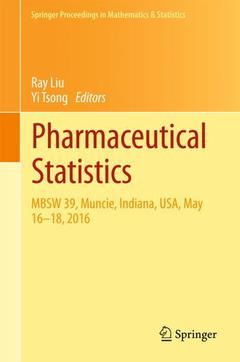Pharmaceutical Statistics, 1st ed. 2019 MBSW 39, Muncie, Indiana, USA, May 16-18, 2016 Springer Proceedings in Mathematics & Statistics Series, Vol. 218

This book presents the proceedings of the 39th annual Midwest Biopharmaceutical Statistics Workshop (MBSW), held in Muncie, Indiana on May 16?18, 2016. It consists of selected peer- reviewed and revised papers on topics ranging from statistical applications in drug discovery and CMC to biomarkers, clinical trials, and statistical programming. All contributions feature original research, and together they cover the full spectrum of pharmaceutical R&D ? with a special focus on emergent topics such as biosimilarity, bioequivalence, clinical trial design, and subgroup identification.
Founded in 1978, the MBSW has provided a forum for statisticians to share knowledge, research, and applications on key statistical topics in pharmaceutical R&D for almost forty years, with the 2016 conference theme being ?The Power and 3 I?s of Statistics: Innovation, Impact and Integrity.? The papers gathered here will be of interest to all researchers whose work involves the quantitative aspects of pharmaceutical research and development, including pharmaceutical statisticians who want to keep up-to-date with the latest trends, as well as academic statistics researchers looking for areas of application.
Ray Liu, PhD, is the Head of Statistical Innovation and Consultation at Takeda Pharmaceutical Company. Dr. Liu received his BS and MA degrees from the National Taiwan University, Taiwan and his PhD from Columbia University, USA. He currently oversees the development of novel methodologies and provides statistical consultation and project support to various functional areas in pharmaceutical R&D, including Discovery, CMC, Translational Research, and Outcome Research. Dr. Liu was the conference chair of the 38th and 39th Midwest Biopharmaceutical Statistics Workshop. He is the author of more than 30 statistical and scientific articles and book chapters, editor of the Springer book “Statistical Applications from Clinical Trials and Personalized Medicine to Finance and Business Analytics”, frequent conference speaker on Big Data and the member of the ASA, PSTC Stats working group, IQ consortium, and NCBLF.
Yi Tsong, PhD, is the Division Director of Biometrics at the Food and Drug Administration (FDA). He specializes in post-marketing risk assessment, drug manufacturing process control and quality assurance, active control non-inferiority/equivalence tests, adaptive design, bioequivalence and analytical biosimilarity, and QTc trials, and has published more than 90 articles in these areas. Dr. Tsong received his PhD in Statistics from the University of North Carolina at Chapel Hill, USA and did his post-doctoral training in cardiovascular prevention and biostatistics at Northwestern University Medical School, USA. He has served as the Treasurer, Board Director, and President of the International Chinese Statistical Association and currently serves as Associate Editor of Statistics in Medicine, the Journal of Biopharmaceutical Statistics,and Pharmaceutical Statistics.
Presents research from the premier conference on statistical research and applications in pharmaceutical R&D
Offers original, peer-reviewed research
Addresses biosimilarity, bioequivalence, clinical trial design, and subgroup identification – emergent topics critical to current pharmaceutical R&D
Includes novel topics for statistical methodology research
Date de parution : 06-2019
Ouvrage de 337 p.
15.5x23.5 cm
Thème de Pharmaceutical Statistics :
Mots-clés :
pharmaceutical statistics; clinical trial; CMC; biomarker; subgroup analysis; biosimilarity



